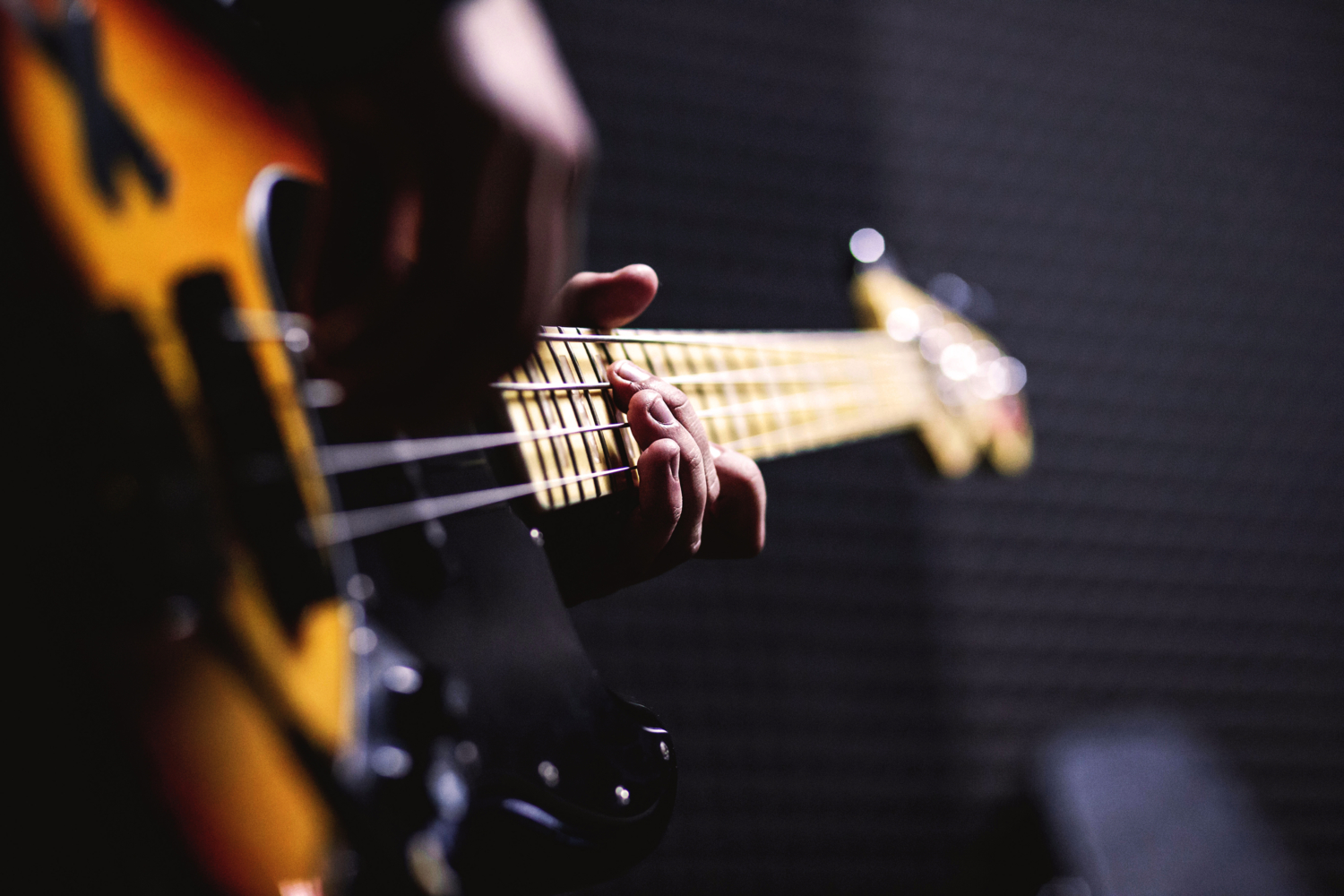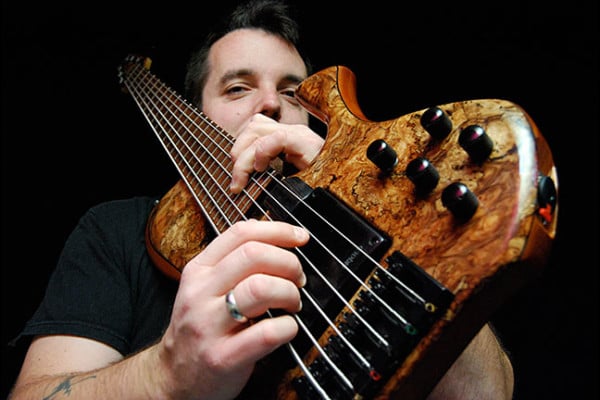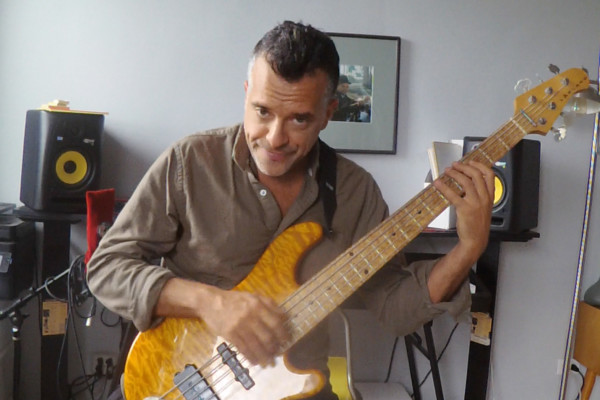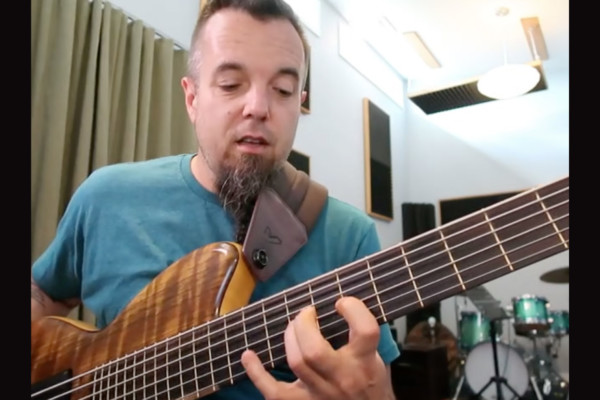Learning the Fretboard Without Getting Bored

Q: I’m wondering how to develop an expanded knowledge of the fingerboard without falling into a rut. I have been working on “Straight, No Chaser” for a couple of months. I know I should bifurcate my practice time to learn tunes I like and add melodic and technical ideas to my “bag of tricks.” However, I still see the value in and am getting a lot of great things out of: 1) Arpeggiating chords in a chord progressions in multiple set positions. 2) Playing chords scales in chord progressions in multiple set positions starting with the lowest reachable note. 3) Exploring various voice leading options. Should I move onto different chord progressions/tunes or stick with one song until I can play it in a lot of different ways across the instrument?
A: I’ll address this in two parts. First I’ll address the question of whether or not to work on one tune endlessly until you have it down, before moving on to a new tune. Then let’s talk about fretboard awareness.
My general advice is this: If you feel like you are challenging yourself in new ways, learning, evolving, and growing on the instrument, I don’t see an urgent need to change things up. However, you will want to change them up eventually. It all depends on where you are in the process.
Different tunes present different challenges. With the kind of shedding it sounds like you’re doing, one could spend a lifetime on any tune and still find ways to challenge yourself. However, you mentioned not falling into a rut. Whenever I hit a rut, I take it as a sign that I need to re-evaluate what I’m doing and find some new stuff to inspire and challenge me.
Sometimes a rut can mean that you’re running too similar materials in too similar a way. Meaning that you may not be pushing limits anymore, but rather exploring too many variations on a theme. Switching tunes may be just what you need.
Sometimes a rut can be the result of working on only one aspect of your playing for too long. If you only shed speed drills, for example, you may find you’re playing uninspired because it lacks harmonic depth or variety. If you are only running scalar and arpeggio exercises and hit a rut, you may need to expand that into actual melodic content (learning heads, exploring reharmonizations of tunes, etc.), or build your rhythmic vocabulary. We need to continually shake the tree a little bit to find new inspirational nuggets, I think.
I tend to hit ruts these days because I spend all of my time shedding for gigs but never have any time to practice, so I feel like my growth is limited, even if I’m playing for hours every day. I’m not pushing myself but rather simply maintaining.
My advice would be to split up your practice time and incorporate some new material. It may be as simple as picking another tune to dig in to. You could split your time between the two (I’d choose one that is markedly different from “Straight, No Chaser” in an attempt to explore some new directions and find new challenges).
You might also explore an entirely new arena, to ignite creativity. Get a looper and give yourself 20 minutes of free exploration by yourself and whatever loops you improvise, for example. If you’ve spent 45 minutes drilling one tune, follow that with the opportunity to take that harmonic workout and explore what you hear and how you react to what has been played. Exploring freedom within music can be just as fruitful as working every chord scale of a tune. Dig into the details and then let it all go and play freely, in other words. Give yourself time to explore both sides of the equation.
It’s important to explore everything that music has to offer, just as it’s important to take the time to dig deeply into one thing, at times. Only you (or someone who knows your playing very well) can know what you’re excelling at, what you’re avoiding, and what you may be missing. If you feel like you might be missing out on something by focusing too hard on one thing, take a break and explore other things. Even if you come back to it with the realization that you are doing exactly what you should be doing in the moment, you won’t be any worse off, and you may have even gained some perspective in the process.
Now, about developing that expanded knowledge of the fingerboard, it sounds like you are doing some very good work. Again, here may be an opportunity to expand your perspective a little bit.
You mentioned that you play everything in multiple set positions, which is fantastic! If you are already doing that, then yes, I would suggest that you include more tunes into your repertoire. It can take years to really get those exercises down, and you’ll drive yourself nuts playing just one song over and over again. Additionally, exploring those exercises over different tunes will present you with new challenges (as I said earlier) and force you to make new connections. This will help you to internalize the ability to recognize the notes available, how they relate to a variety of chord types surrounding those notes, as well as where they land on the fretboard in relation to each other.
In other words, working on a new tune will help you to play “Straight, No Chaser” better!
As far as literal fretboard awareness goes, reading notation is still the best way to map it out, in my opinion. Whether it’s Bach cello suites, Charlie Parker heads, or written transcriptions out of a book, they will all help you to map out that fretboard quicker than most anything else ever could. It’s a direct connection. You have to look at a note and instantly recognize what the note is, recognize all of the different places you could play it and then evaluate what position and fingering makes the most sense for the line as a whole. Sight-reading notation is, bar-none, the absolute best way to learn your finger-board.
The second best way is writing notation, whether it’s your own music or a transcription you did. It doesn’t matter. It’s the way to train your brain to make the connections necessary to know your fretboard like the back of your hand.
I hope there is some food for thought in here that resonates. Best of luck!
Have a question for Damian Erskine? Send it to [email protected]. Check out Damian’s instructional books, Right Hand Drive and The Improviser’s Path.



